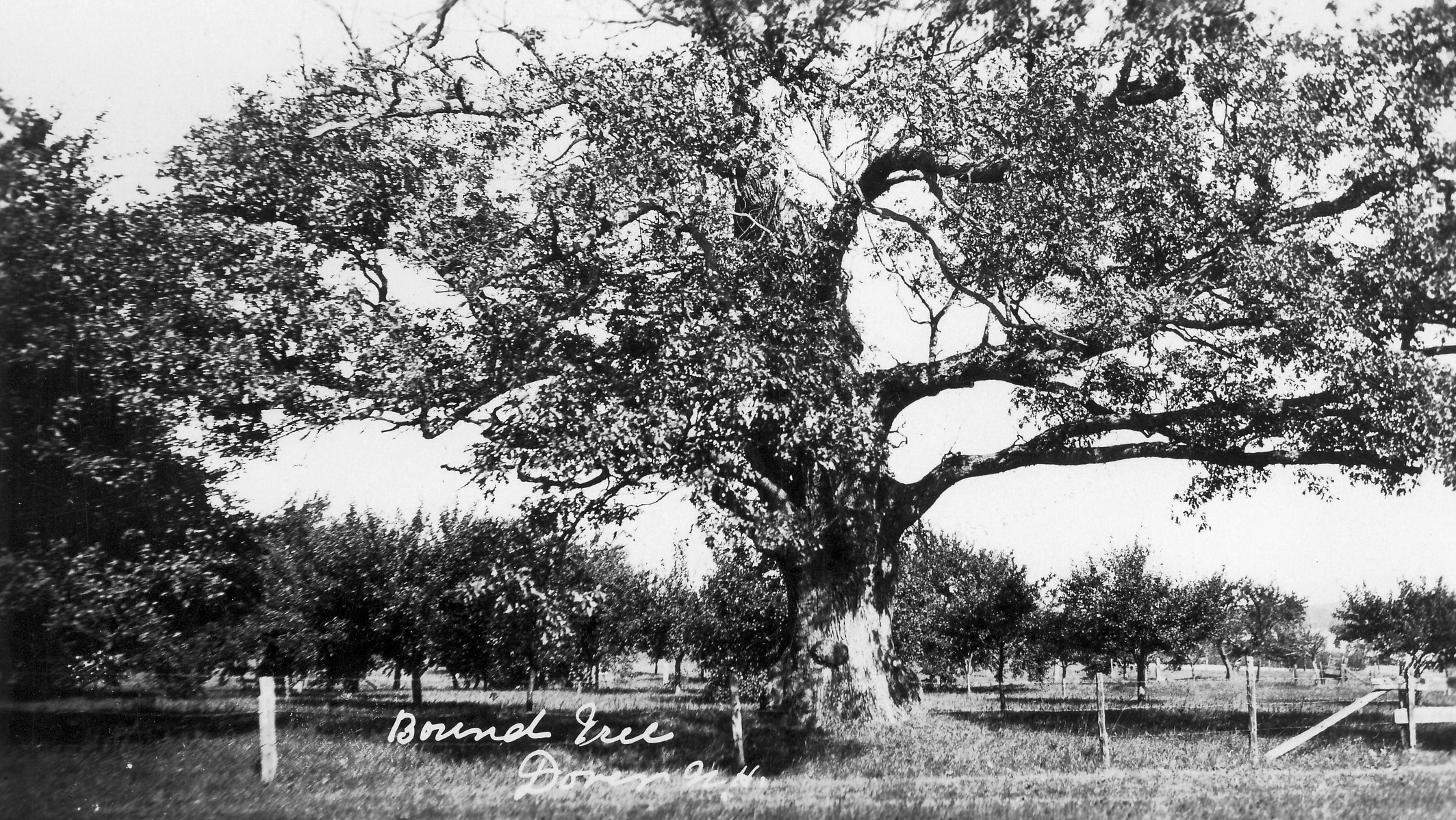Disclaimer
The Dover Public Library website offers public access to a wide range of information, including historical materials that are products of their particular times, and may contain values, language or stereotypes that would now be deemed insensitive, inappropriate or factually inaccurate. However, these records reflect the shared attitudes and values of the community from which they were collected and thus constitute an important social record.
The materials contained in the collection do not represent the opinions of the City of Dover, or the Dover Public Library.
Bound Oak

The Bound Oak no longer stands.
There were two historic trees standing on Dover Neck in 1915; one is now living, the other is dead; they were the “Bound Oak” and the “Millet Apple Tree.” The first mentioned stands in the Howard Millet Roberts’s orchard, about thirty-five rods east of the Roberts house on the State road. This tree is more than 300 years old, and must have been quite a good size tree when Edward Hilton and his party landed at Pomeroy’s Cove, at Dover Point, in the spring of 1623. This oak is twenty-three feet in circumference at the base; at eight feet from the ground it is fifteen feet in circumference; the lowest branch is about twelve feet from the ground. The central part of the tree, when complete was about ninety feet tall; that central part became decayed and a large part of it fell off a few years ago; the remaining branches encircle a space ninety feet in diameter. It is a grand old monarch now; it was magnificent when in full leaf with its full top and wide spreading branches. It is much regretted there is no picture of it in its prime.
The first owner of the land on which it stands was Governor Thomas Roberts; the land has always remained in possession of his descendants, coming to the present owners by regular inheritance from father to son; eight generations. It received its name from the fact that it stood on the boundary line between the farms of Governor Thomas Roberts two sons, Thomas and John; the former’s farm was on the north side of the tree, and the latter’s was on the south side.
A Wrestling Match Under the Oak
The event took place several years before the Revolutionary war. There were several negro slaves owned by residents of Dover Neck; they were the reminders of the trade that had been carried on a great many years with Barbadoes Island and the West Indies in general, when negro slaves were brought up here on return voyages, and they and their children were held as slaves; they were glad to get here and escape from the cruel masters they had worked under in the islands; they never wanted to leave Dover, where they were kindly treated, There work here was play compared to what they had to do on the sugar plantations in the West Indies.
Mr. Roberts’s grandfather, Joseph Robert, had a stalwart negro named Caesar; Joseph’s kinsman, Thomas Roberts, who lived where Mr. William M. Courser now lives, also had a negro slave named Pompy, who was a stalwart as Caesar. One day their masters got to bragging about their colored servants; each claimed his man was the best. Finally, in a friendly way, they agreed to let their men try their strength at a wrestling match, that then being a fashionable sport among the farmers. It was decided to hold it under the “Bound Oak,” as that was on the dividing line between the two neighbors. The day was set and the neighbors were invited to attend and witness the contest of strength and skill in wrestling.
At the appointed time the neighbors gathered und the old monarch of the forest primeval, and Caesar and Pompy came prepared to entertain the spectators, with all the strength and agility that was in them. It was agreed that the winner must throw his opponent and hold him to the ground on that side of the dividing line which was his master’s land, the oak showing which was Joseph’s and which was Thomas’s farm.
Caesar took his stand on the south side of the oak; Pompy faced him on the north side; the word was given and the contest began, in accordance with the rules of the game in that period. They did some fine sparring, covering much ground, then clinched for a throw, and Caesar downed Pompy; the crowd cheered; but it was not a win, as Caesar had thrown him on the wrong side of the oak; the men were on their feet almost as quickly as they were down, and renewed their sparring; first on one side of the oak then on the other, then all around it; the spectators were cheering continually; each threw the other several times, but in each instance on the wrong side of the tree; which would not count to win. The struggle went on in this way for about an hour, or so. It was a hot day in September; the men began to get weary, but at last Caesar got Pompy onto the south side of the oak and threw him to the ground and held him there firmly until he was declared the winner. The spectators cheered, and then stepped forward and congratulated both of the boxers on the fine work they had done and the good sport they had provided for the dwellers on Dover Neck.
From “History of Dover, New Hampshire. vol. 1. : Containing historical, genealogical and industrial data of its early settlers
This historical essay is provided free to all readers as an educational service. It may not be reproduced on any website, list, bulletin board, or in print without the permission of the Dover Public Library. Links to the Dover Public Library homepage or a specific article's URL are permissible.
